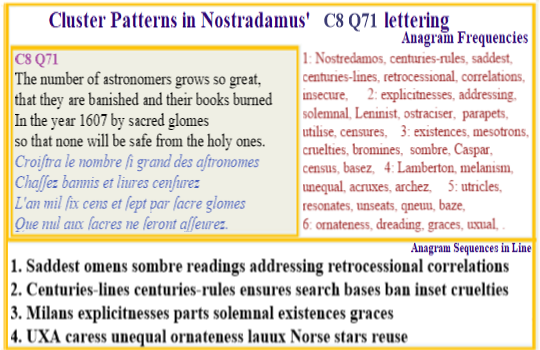 Analyses of all verses
Analyses of all verses
|
 Web Site
Web Site |
 All
Sefirots All
Sefirots |
Nostradamus C8 Q71: Scaliger's astronomy and dating methods.
Copyright: Allan Webber, December 2015
This verse relates to events forty years after Nostradamus' death. The year 1607 was a time at which the new generation of astronomic views was under great challenge by religious traditionalists but it is also the year when Joseph Juste Scaliger's Protestant based scholarship was undermined by the Jesuits.
Scaliger transformed the dating mechanism for ancient texts and relied on physical phenomena such as astronomic settings to build his historical chronologies.
Joseph Scaliger was the youngest son of Jules Scaliger, the person who served as Nostradamus' mentor in the years preceding Joseph's birth.
I believe the method Nostradamus used to date his future visions arose through the debates with Jules during that time. (See my paper on Jules of Agen for more on these themes).
 There are two anagrams relevant to Joseph
Scaliger in the third line. These are Scaloger Manilis
with the name Scaloger possibly being an encripted version indicating
Joseph the son of Jules Scaliger through the inclusion of the second letter
from the son's name.
There are two anagrams relevant to Joseph
Scaliger in the third line. These are Scaloger Manilis
with the name Scaloger possibly being an encripted version indicating
Joseph the son of Jules Scaliger through the inclusion of the second letter
from the son's name.
Similarly Manilis becomes Manilius by inclusion of the second letter of Josephs second name (Juste).
Joseph Scaligers historical dating methodology was first publised in a volume titled Manilius in 1579.
.
Extra Info:
This verse shows some intriguing variations in the manner of the anagrams encodement when dealing with topics where his name and his Pophecies were the focus. In these verses he uses sophisticated splitting techniques.
So in this verse the second line holds an anagram for centuries in two parts that are separated by the the letter 'l'. This lone letter combines with the remaining lettering to the left of that for centuries to form an anagram for line while on the right it forms an anagram for rules. The resultant anagrams 'centuries-lines and 'centuries-rules' are very topical and only occur in this line of verse.
Similar splits occur in the first line and involve his name and variants on astronomy related words. This technique is taken to a further extreme in an earlier verse C02 Q.6 which holds a split anagram for Michel Nostredame and whole anagrams for comets and story.
Key Ideas:
retrocessional, centuries-lines, centuries-rules, correlations, Nostredamos, mamelons, insecure, saddest, explicitnesses, addressing, ostraciser, solemnal, Leninist, parapets, utilise, censures, queenz, bassez, banz, existences, mesotrons, astronome, cruelties, bromines, ensurez, sombre, Caspar, census, basez, Lamberton, melanism, unequal, acruxes, archez, utricles, resonates, unseats, qneuu, baze, ornateness, dreading, graces, uxual, Montreals, sentinal, Manilis, Montrose, law, Greek, relations, resonate, Salome, trials, Iseult, Curies, Essene, moron, comes, secure, grace, cxi, new, entrails, almoner, Patras, stars, realist, saddens, Milans, insane, Eddas, treasons, Moon, Arcas, Septet, alone.